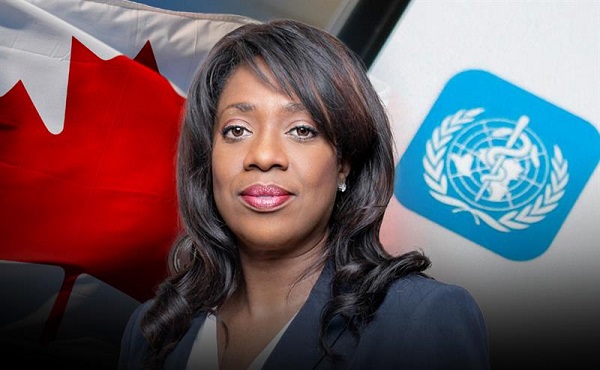Health
Leslyn Lewis urges Canadians to fight WHO pandemic treaty before it’s legally binding

From LifeSiteNews
Conservative MP Leslyn Lewis is urging Canadians to demand a parliamentary debate on the WHO Pandemic Agreement, highlighting risks to national sovereignty.
Conservative Member of Parliament (MP) Leslyn Lewis called on Canadians to petition against the World Health Organization’s (WHO) pandemic treaty before it becomes legally binding.
In an October 23 post on X, Lewis encouraged Canadians to demand that politicians debate the WHO Pandemic Agreement before it becomes law after warnings that the treaty could undermine national freedom and lead to global surveillance.
“I have raised red flags about its implications on Canada’s health sovereignty and the federal government’s willingness to enter a legally binding treaty of this weight without any input from Parliament,” she declared.
In May, Canada, under Liberal Prime Minister Mark Carney, adopted the treaty despite warnings that the agreement gives the globalist entity increased power in the event of another “pandemic.”
However, Lewis revealed that since the agreement has yet to be officially signed, Canada is not bound to it and can still make amendments.
“We are now in a critical window of opportunity to ask tough questions and debate the treaty before it is signed by the Minister of Foreign Affairs and binds our nation,” she explained.
Lewis encouraged Canadians to sign a petition calling for a debate of the agreement as well as contacting their local MPs to request a parliamentary review of the treaty.
Lewis revealed that Canadians’ persistent opposition to the treaty has already resulted in some of the more dangerous clauses, including restricting free speech, freedom of movement, and government surveillance, being removed from the final agreement.
“Thanks to the engagement of countless Canadians and concerned citizens around the world, the most extreme provisions in the WHO Pandemic Treaty were removed — these measures would have undermined national healthcare sovereignty and given international bureaucrats sweeping powers,” Lewis declared.
“The removal of provisions on vaccine mandates, misinformation and disinformation, censorship requirements, travel restrictions, global surveillance, and mandatory health measures happened because people paid attention and spoke up,” she continued.
Among the most criticized parts of the agreement is the affirmation that “the World Health Organization is the directing and coordinating authority on international health work, including on pandemic prevention, preparedness and response.”
While the agreement claims to uphold “the principle of the sovereignty of States in addressing public health matters,” it also calls for a globally unified response in the event of a pandemic, stating plainly that “(t)he Parties shall promote a One Health approach for pandemic prevention, preparedness and response.”
Health
Saskatchewan woman approved for euthanasia urged to seek medical help in Canada rather than US

From LifeSiteNews
Saskatchewan Premier Scott Moe encouraged Jolene Van Alstine, who has a rare disease, to work with his government on a solution.
Saskatchewan Premier Scott Moe is urging a woman with a rare disease, who has been approved to die by euthanasia because she can’t get proper care, to instead work with his government on a solution.
As reported by LifeSiteNews last week, Saskatchewan resident Jolene Van Alstine was approved to die by state-sanctioned euthanasia because she has had to endure long wait times for what she considers to be proper care for a rare parathyroid disease.
Van Alstine’s condition, normocalcemic primary hyperparathyroidism (nPHPT), causes her to experience vomiting, nausea, and bone pain.
As a result of Van Alstine’s frustrations with the healthcare system, she applied for Canada’s Medical Assistance in Dying (MAiD) and was approved for a January 7, 2026, death date.
Her case drew the attention of American media personality Glenn Beck, who has been in contact with Van Alstine to determine whether she can get the surgery done in the United States. Even the administration of U.S. President Donald Trump has been briefed on the matter.
According to Moe, Van Alstine has taken her case to Saskatchewan Health Minister Jeremy Cockrill, asking for help.
“There has been an opportunity to see specialists in Saskatchewan and outside of Saskatchewan, and those conversations about maybe potentially seeing additional specialists continue with the minister’s office and the Ministry of Health,” Moe said yesterday at a press conference.
“I would hope that she’d continue to work with the Ministry of Health, because I think there’s work going on to see even additional specialists at this point,”
A recent Euthanasia Prevention Coalition report revealed that Canada has euthanized 90,000 people since 2016, the year it was legalized.
Even some lobby groups have pushed for MAiD to be expanded to minors.
As reported by LifeSiteNews, over 23,000 Canadians have died while on wait lists for medical care as Prime Minister Mark Carney’s Liberal government focuses on euthanasia expansions.
Health
Canadian gov’t considers sharing census data on gender-confused children

From LifeSiteNews
Statistics Canada recently consulted LGBTQ+ groups on releasing 2021 census data about gender-confused children ages 0-14, citing research that toddlers could be ‘transgender.’
Statistics Canada is seeking to collect and share data on gender-confused children in its latest move to promote the LGBT agenda to minors.
From November to mid-December, Statistics Canada held consultations with various LGBT groups to discuss how to release 2021 census data on gender-confused children ages 0-14, according to a report shared with the National Post.
“For the upcoming 2026 Census, Statistics Canada has been consulting with the Canadian population, experts and stakeholders on gender,” the government agency wrote in a recent report.
“The Agency has finished conducting extensive qualitative and quantitative testing, notably to assess the impact of modifying the gender response categories to include ‘man’ and ‘woman,’ and ‘boy’ and ‘girl’ for those younger than 15 years,” it continued.
In 2021, StatsCan conducted the first-ever census to collect data on sex assigned at birth as well as how Canadians later ‘identified’ as their gender. The census collected data from Canadians of all ages but only published that of Canadians 15 years and older.
According to the information, released April 2022, 0.33% of the Canadian population age 15 or older were gender-confused, with 0.19% believing they are transgender and 0.14% believing they are non-binary.
The report noted that “younger generations may be more comfortable reporting their gender identity than older generations.”
Now, StatsCan is seeking to further push the LGBT agenda on young children by releasing data to support their argument that young children can be “transgender.”
According to a copy of its most recent report, “children and youth are often assumed to be cisgender (people whose reported gender corresponds to their birth sex) from birth until they ‘come out’ as a different gender on their own accord.”
“Researchers suggest that children aged 18 to 24 months are developmentally capable of recognizing gender norms and expressing gendered behaviours in visible ways,” it continued.
“Research also suggests that, like cisgender children, transgender and non-binary children may recognize their own gender identity as early as 2 to 3 years old or during later childhood or early adolescents,” the document read.
The StatsCan report conveniently ignores scientific data on the harms of gender-transitioning interventions, both on the physical and mental health of individuals, particularly children.
A significant body of evidence shows that “affirming” gender confusion carries serious harms, especially when done with impressionable children who lack the mental development, emotional maturity, and life experience to consider the long-term ramifications of the decisions being pushed on them, or full knowledge about the long-term effects of life-altering, physically transformative, and often irreversible surgical and chemical procedures.
Studies find that more than 80 percent of children suffering gender dysphoria outgrow it on their own by late adolescence and that “transition” procedures, including “reassignment” surgery, fail to resolve gender-confused individuals’ heightened tendency to engage in self-harm and suicide – and even exacerbate it, including by reinforcing their confusion and neglecting the actual root causes of their mental strife.
As LifeSiteNews has previously noted, research does not support the assertions from transgender activists that surgical or pharmaceutical intervention to “affirm” confusion is “necessary medical care” or that it is helpful in preventing the suicides of gender-confused individuals.
In fact, in addition to asserting a false reality that one’s sex can be changed, transgender surgeries and drugs have been linked to permanent physical and psychological damage, including cardiovascular diseases, loss of bone density, cancer, strokes and blood clots, infertility, and suicidality.
There is also overwhelming evidence that those who undergo “gender transitioning” are more likely to commit suicide than those who are not given irreversible surgery. A Swedish study found that those who underwent “gender reassignment” surgery ended up with a 19.2 times greater risk of suicide.
Indeed, there is proof that the most loving and helpful approach to people who think they are a different sex is not to validate them in their confusion but to show them the truth.
A new study on the side effects of transgender “sex change” surgeries discovered that 81 percent of those who had undergone “sex change” surgeries in the past five years reported experiencing pain simply from normal movement in the weeks and months that followed — and that many other side effects manifest as well.
-

 Great Reset2 days ago
Great Reset2 days agoViral TikTok video shows 7-year-old cuddling great-grandfather before he’s euthanized
-

 Daily Caller2 days ago
Daily Caller2 days agoChinese Billionaire Tried To Build US-Born Baby Empire As Overseas Elites Turn To American Surrogates
-

 Alberta2 days ago
Alberta2 days agoSchools should go back to basics to mitigate effects of AI
-

 Business2 days ago
Business2 days agoMajor tax changes in 2026: Report
-

 International2 days ago
International2 days agoTwo states designate Muslim group as terrorist
-

 Digital ID1 day ago
Digital ID1 day agoCanada releases new digital ID app for personal documents despite privacy concerns
-

 Censorship Industrial Complex2 days ago
Censorship Industrial Complex2 days agoDeath by a thousand clicks – government censorship of Canada’s internet
-

 Bruce Dowbiggin1 day ago
Bruce Dowbiggin1 day agoNFL Ice Bowls Turn Down The Thermostat on Climate Change Hysteria






